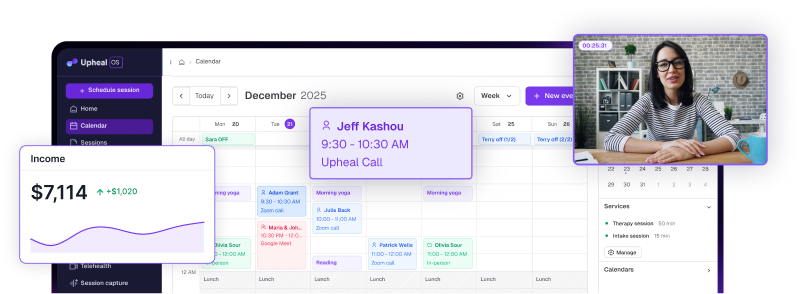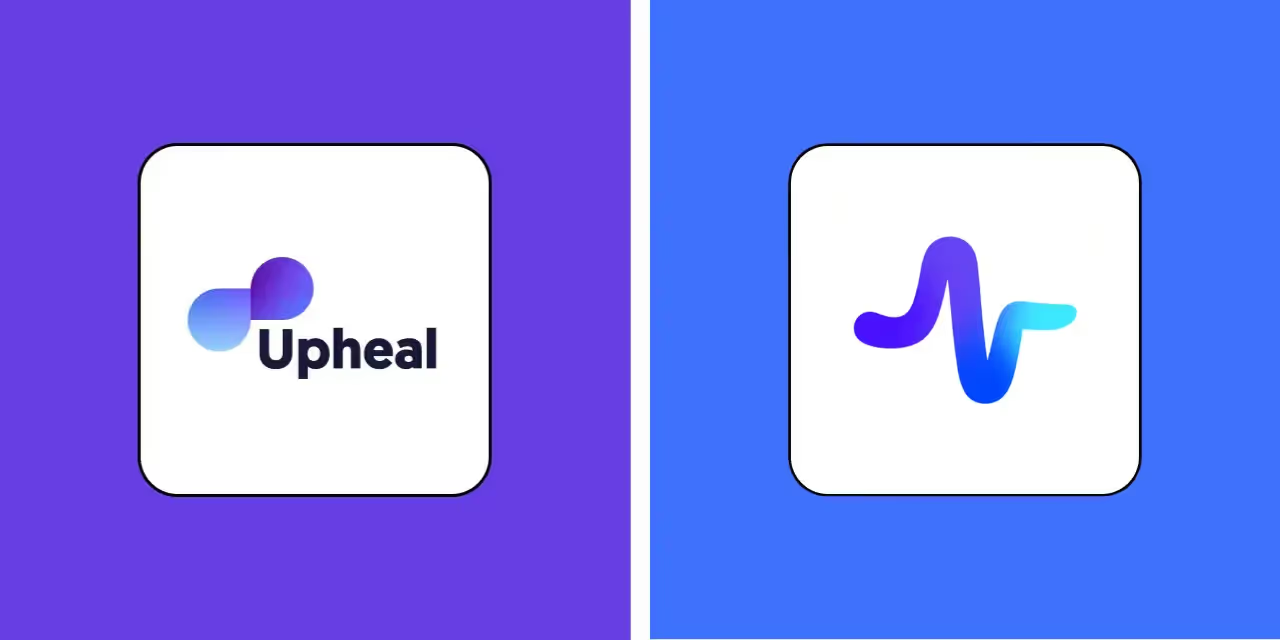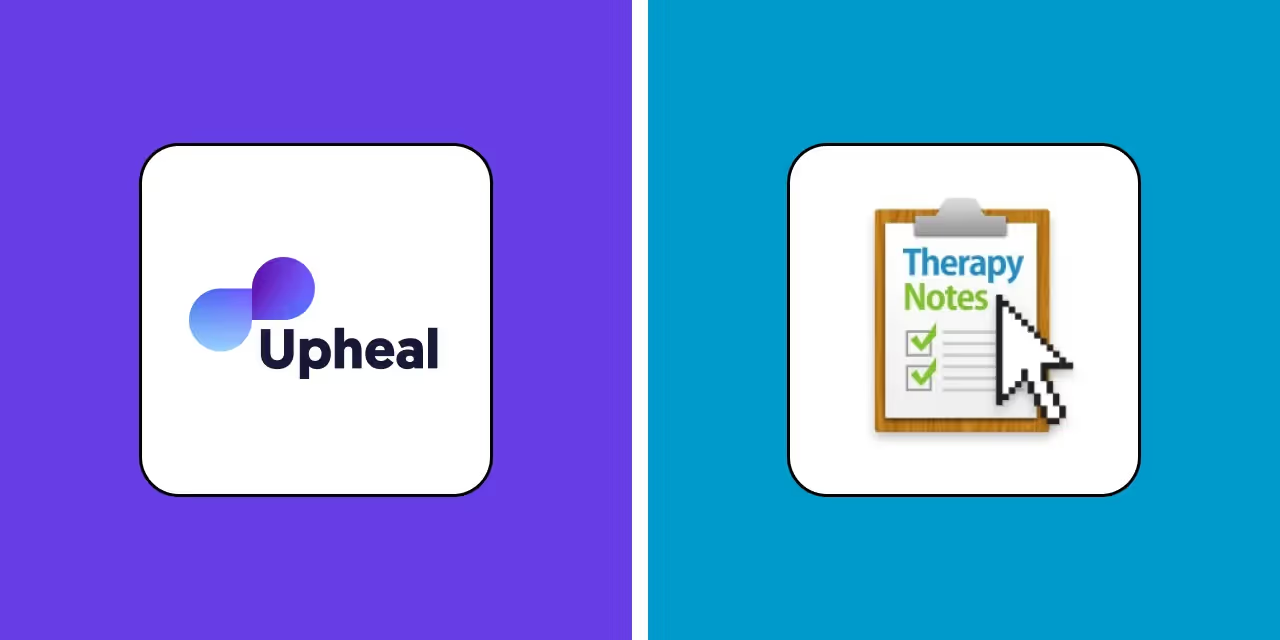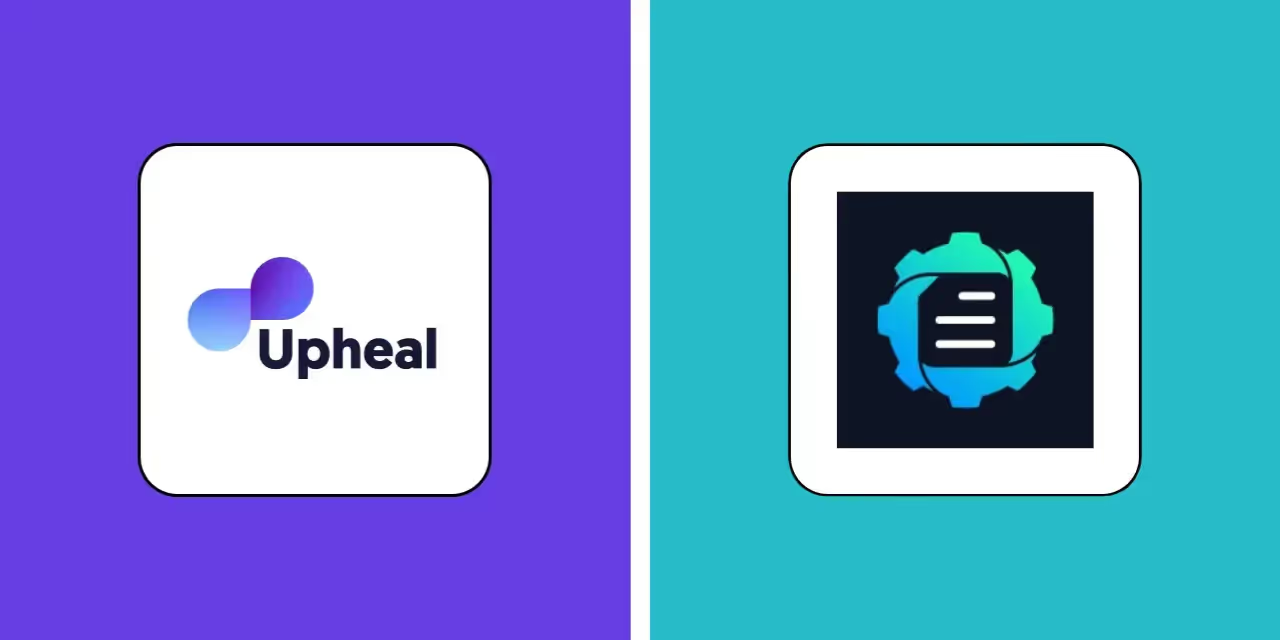Upheal vs SimplePractice: Comparing the privacy of AI tools for therapists

By Ted Faneuff, LCSW - Head of Clinical Operations, Upheal
I still remember the day vividly.
It was middle of the weekend, my kids were home, playing, just in sight.
And I was hunched over my dining room table, staring at a stack of session notes and a computer screen that seemed to mock my exhaustion.
My eyes burned, a fog clouded my memory of each session, and that familiar weight of overwhelm settled in my chest. Most agonizingly, I was missing out on precious time with my children.
That was my breaking point. I literally collapsed forward onto my dining room table, forehead hitting the keyboard, and thought: "There has to be a better way."
When Upheal emerged as a solution, I quickly realized that saving time wasn't my only concern. The real question that kept me awake wasn't just 'How can I finish my notes faster?' but 'How can I use new technology while still protecting my clients' privacy?
Client privacy is more important than administrative simplicity
As therapists, our clients entrust us with their deepest struggles. Every conversation is profoundly private, and how we handle that information extends beyond merely adhering to HIPAA rules.
As I have compared AI documentation tools, I discovered how different platforms handle your client conversations in very different ways — and some, in very alarming ways.
Let’s break down what a few key differences in approach:
Deleting session data, or storing it
Healthcare records are especially susceptible to hacking, and providers are accountable for ensuring their security.
Recent years have seen more than 600 incidents of healthcare records getting leaked.
All that to say: therapists should really be thoughtful when choosing AI tools, considering what information is being stored, and assuming it could be vulnerable to a data breach.
SimplePractice follows the same protocol as most software companies, where session data is stored on SimplePractice’s servers for your future reference, and to help them improve their product.
Upheal, by contrast, allows you to use its scribing features without storing any data. Upheal also allows therapists to delete any session data, immediately.
Asking permission first, or opting in by default
Platforms like Upheal never use your client data to train their AI unless you and your client specifically agree. Our AI assists with notes but doesn't learn from your conversations for broader AI training or to train a therapist replacement.
Tools like SimplePractice, by default, use your session transcripts to improve their AI for everyone. While some allow clients to turn this off, clients must actively find and change that setting. These platforms assume clients are okay with sharing data unless told otherwise. This approach diverges from platforms that ask permission first; Upheal will only use (de-identified) data once the client has reviewed and agreed to their privacy policy.
The hidden cost of convenience: what therapists risk
Many platforms advertise HIPAA compliance. However HIPAA doesn’t prevent them from using your session recordings to train AI, unless you explicitly opt out.
That means your client’s story could shape how another therapist’s AI behaves.
Imagine a client asking, "What happens to our recordings?" — would you be 100% confident in your answer?
Most therapists I’ve spoken with incorrectly assumed that HIPAA protections meant their transcripts weren’t being used to train AI. In reality, many platforms use de-identified session data for model training by default—unless you know where to look and opt out. That means your client’s words may already be contributing to someone else’s AI, without your explicit awareness. And once that data is used, there’s no undoing it.
“Alongside tracking patient progress, Upheal maintains rigorous privacy standards, making it an invaluable tool for modern professionals.” – Gino C., LPC.
Upheal vs SimplePractice: what this means for your practice
Upheal and SimplePractice offer compelling examples of these different approaches to privacy and AI applications.
Upheal's privacy-focused approach
Upheal works differently from typical tech platforms. Rather than trying to replace your whole practice management system, we focus specifically on AI that supports clinical work while keeping your data completely private.
What this looks like in practice:
- Your clients have to explicitly agree before any of your data trains their AI
- Your session transcripts are stored separately from your notes
- You get clear information about how they handle legal requests for records
- You can control exactly what data gets kept and what gets deleted
- You can use Upheal for in-person sessions, without being forced to use a telehealth platform or recording device
Crucially, Upheal does not use your transcripts for AI training by default without agreement from both you and your client. That’s been Upheal’s practice, from the very beginning.
It means you and your clients don't have to worry about data being repurposed behind the scenes without consent. Every transcript is stored separately from final notes, and you retain full control over what's saved, deleted, or shared.
SimplePractice's all-in-one approach — with tradeoffs
SimplePractice aims to consolidate everything under one roof. If you already use SimplePractice for billing, client messages, and video calls, adding their AI features might seem logical. It eliminates the need to learn a new system or manage multiple logins.
By consolidating numerous features, SimplePractice is a good fit for many clinicians aiming to simplify their tech stack. However this convenience often comes with less flexibility.
Beyond flexibility, its vital to consider that your de-identified session transcripts may be used to train their AI for all users, based on what’s in their privacy policy at the time of this writing.
While SimplePractice announced on June 11, 2025 that they would begin working on an opt-out feature, this still means that for now, your data might be used by default unless you know where to look and actively change a setting that may become available in the future.
Upheal is more powerful than Note Taker.
For most of this article, I’ve been focusing on the stark contrast between Upheal and SimplePractice when it comes to privacy — because it is very important!
But, an honest comparison wouldn’t be complete without mentioning some equally-obvious differences when it comes to features.
Note Taker is SimplePractice’s very first foray into AI tools. So — very reasonably — it is a bit more simple and limited in what it can do. Think transcription, note generation, and basically doing some of the writing for you.
Upheal has been developing build-for-purpose AI over years. Around the same time that Note Taker was released, Upheal was launching Golden Thread; a total reimagining of treatment planning that creates a client-centered narrative that integrates all the components of their care.
If you’re deciding between the two programs, and functionality is an important consideration, you should know that Upheal is simply more powerful than Note Taker.
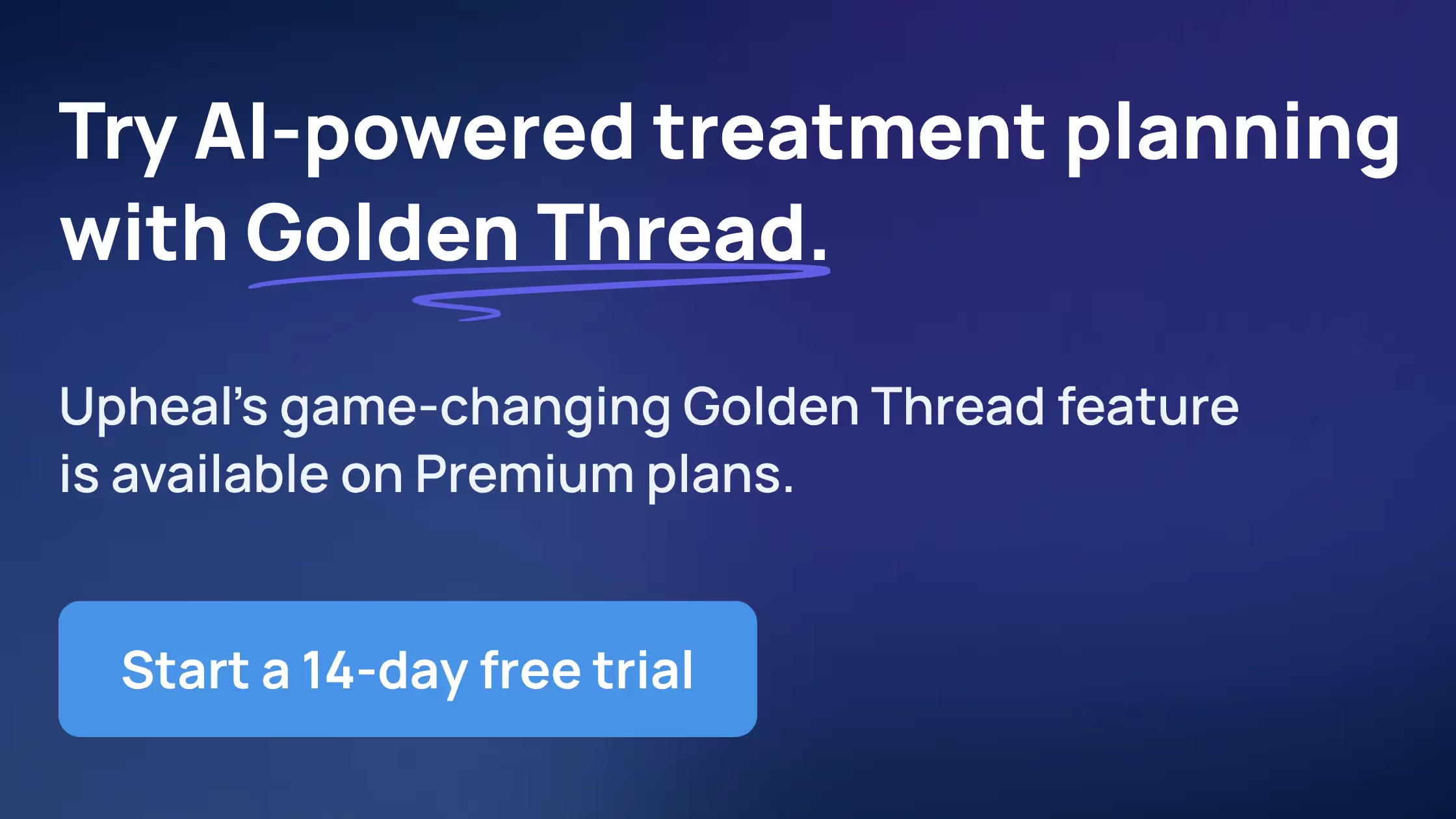
Getting AI to help deliver care both efficiently and securely
For many clinicians who are (rightfully) wary of AI, the decision to adopt it can feel like choosing between saving time and upholding your ethics.
However, with the deep experience I’ve gained in AI and behavioral health tech, I can confidently say that you can strike a balance between efficiency and ethics by choosing the right tool. You deserve access to modern technology, without compromising your professional standards.
Between these two platforms, I don’t think there is a right or wrong choice — just right for your practice. Choosing either (or both) depends on what support you want.
If you're all-in with SimplePractice, and admin is going well for you…
SimplePractice's AI note-taking feels natural because it's built directly into the platform you're already using. You don't need to learn new software or switch programs, providing genuine convenience by keeping everything in one place.
If you want to stay on SimplePractice, but need documentation to feel better…
Note Taker is an adequate for clinicians who feel enthusiastic about SimplePractice, who are confident in their ability to manage the security of their clients data, and who just want some help with session transcription.
If those three criteria don’t perfectly describe you, then you might want to consider a hybrid approach between the two platforms.
You can get all the power and privacy of Upheal, while still sticking to SimplePractice for your EHR and admin. And, with Upheal’s new Smart Fill feature, you can use Upheal’s advanced features directly in SimplePractice.

If you value privacy and want more data control…
Upheal has been a game-changer for my practice because it works with whatever video platform my clients prefer while keeping their data secure. Some clients like Zoom, others prefer phone calls, and some want in-person sessions.
I can create notes from any of these formats without forcing everyone to use the same technology — and without worrying about their conversations being used to train AI for other therapists.
The practical benefit: I'm not locked into one video platform or forced to record every session. My note-taking process can adapt to each client's comfort level while maintaining the highest privacy standards.
What AI can actually do for your clinical work
Here's where things get truly interesting. Upheal can do far more more than simply transcribe a session.
It can track valuable insights such as:
- The talk-to-listen ratio between you and your client.
- Subtle shifts in emotional tone.
- Key topics that emerged during the session.
- Developing patterns in your conversations over time.
These insights aren't merely interesting data points; they become an integral part of the clinical conversation I have with my clients. And critically, all of this analysis happens without my client data being used to train AI for other therapists.
With my old manual note-taking, I was spending 3-4 hours every evening writing up sessions. While AI transcription certainly helps cut that time, AI that genuinely understands therapy saves even more time while ensuring my clients' information remains completely private.
How to decide what's right for your practice
After using both approaches, here's my honest assessment:
Upheal is worth considering if…
- You want explicit control over how your client data is used
- You need to work with different video platforms or session formats
- You want AI that was designed specifically for therapy work
- You prioritize privacy-first approaches over sheer convenience
SimplePractice makes sense if…
- You like having everything in one system
- You're comfortable with the standard tech industry approach to data (opt-out rather than opt-in)
- You primarily use their video platform and don't need flexibility
Practical steps for protecting privacy while improving efficiency
Whatever platform you choose:
- Read the privacy settings carefully and adjust them to match your comfort level
- Talk to your clients about any recording and get their permission
- Start by testing the AI with just a few sessions
- Always review the AI-generated notes before saving them
Critical questions to ask about privacy:
- Where exactly is my client data stored?
- Who can access this information?
- What happens if someone requests records through legal processes?
- How do I delete client data if I need to?
- Can I export my data if I want to switch platforms?
- What happens if a client asks for a copy of their transcript and finds out it was used to train an AI?
The last question is particularly important. If your platform uses session data for AI training by default, you need to be prepared to explain that to clients who ask. Can you honestly say their private conversations haven't been used to improve AI for other therapists?
The bigger picture: building a sustainable profession
That day when I collapsed at my dining room table wasn't just about time management; it was about figuring out how to be a therapist without burning out from paperwork.
But there's another urgent question: How do we use helpful technology while still maintaining the trust that makes therapy work?
The AI tools we choose today will shape how our profession develops. Platforms that prioritize convenience over client privacy might save time in the short run could create serious ethical problems down the road. Privacy-first approaches might require a bit more thought upfront, but they protect what makes therapy special: the unique trust between therapist and client.
This principle has been Upheal’s North Star from the very beginning.
Technology should enhance our ability to be present with our clients, not create new anxieties about privacy. When I found tools that understood this balance — that efficiency without ethics isn't really helpful at all — everything improved in my practice.
Ultimately, your choice of documentation platform is a choice about the kind of therapist you want to be. The right tool should feel like a natural extension of your clinical work, not an additional burden to manage or learn. More importantly, it should be something you can explain to your clients with complete confidence and transparency.
